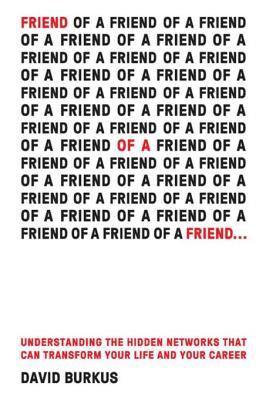
Friend of a Friend . . .
Understanding the Hidden Networks That Can Transform Your Life and Your Career
کتاب های مرتبط
- اطلاعات
- نقد و بررسی
- دیدگاه کاربران
نقد و بررسی

January 8, 2018
For those who find even the word networking cringe-worthy, business school professor Burkus (Under New Management) has an appealing take on how to build connections without feeling insincere or sleazy. He finds most conventional wisdom on the subject stale and outdated. Setting out to correct the misconceptions, Burkus observes that making connections is critical to career advancement and that a strong network means the advantage of access to social capital. Rather than offering a plethora of advice, this book provides insights about how networks actually function, such as the following: weak ties can be more valuable than strong ones; the ability to easily navigate a network is more important than how big it is; straddling the gap between several industries is more effective than knowing every person in a single one; organizational silos are valuable—up to a point; and no one benefits from getting too comfortable on a single team. Buoyed by practical advice and prompts for further thought, this is an excellent guide to career advancement for anyone who breaks out in hives at the mere presentation of a business card. Agent: Giles Anderson, Anderson Literary Agency.

April 1, 2018
A self-help business book that challenges conventional wisdom about networking.As a business professor and contributor to TED and the Harvard Business Review, Burkus (Under New Management: How Leading Organizations Are Upending Business as Usual, 2016, etc.) has compiled plenty of anecdotes and case studies about how successful people have networked to form successful alliances, and he backs these stories with some theoretical underpinnings from the social sciences. Perhaps the most counterintuitive but convincing advice he offers is that your network's weaker ties, the people with whom you have rarely connected for years or even decades, might prove more valuable than your closest connections. The reason? The people you know best usually know the same people and also know what you know. "Our weak ties often build a bridge from one cluster to another and thus give us access to new information," writes the author. "Even though the strong ties in our life are more likely to be motivated to help us, it turns out that our weak ties' access to new sources of information might be more valuable." Each chapter ends with a set of exercises, "Practicing Online," including a link to a template to download. In providing an overview of "how social networks operate and how they create opportunities in work and in life," Burkus stresses the fluidity that a business landscape that changes so rapidly requires: how teams work best when they have a short shelf life, how positioning yourself to connect seemingly disparate camps pays dividends, and how important it is to know how to work inside your silo and when to step outside. The author extends his argument beyond career pragmatism, suggesting that networking events with the goal of expanding those networks are less effective than opportunities to do something together and really get to know each other. Furthermore, many prosperous business relationships begin as personal friendships, with those who like and trust each other looking for something they could accomplish together.A fresh rethinking of a crucial process in today's world.
COPYRIGHT(2018) Kirkus Reviews, ALL RIGHTS RESERVED.

May 1, 2018
In this book, popular TED Talk and Fortune 500 keynote speaker Burkus (leadership, Oral Roberts Univ.; contributor, Harvard Business Review) offers anecdotes and scientific research that reexamine the manner in which businesspeople, entrepreneurs, and job seekers benefit (and fail to benefit) from professional networking. Drawing from such social science principles as structural holes, majority illusion, friendship paradox, self-similarity, and multiplexity, Burkus offers suggestions for expanding as well as strengthening the quality of one's network. He largely debunks the value of participating in traditional networking events and groups (which will come as a great relief to the many people who dread such functions and organizations). He demonstrates the value of making strategic (rather than random) connections and engaging in shared activities among friends and professional contacts. VERDICT This work offers thought-provoking case studies and practical guidelines on a popular but generally misunderstood topic. Of interest to social scientists, business professionals, and job seekers alike.--Alan Farber, Univ. of North Carolina, Chapel Hill
Copyright 2018 Library Journal, LLC Used with permission.

May 1, 2018
The latest from Burkus (Under New Management, 2017), who teaches leadership and innovation at Oral Roberts University, is a frequent speaker at Fortune 500 companies and military institutions, and a prolific writer and TED Talker, aims to help people become more effective in both their career decisions and their individual lives. In this well-documented, well-organized, readable, and accessible work, he brings together a massive amount of research from sociology and network science. His sources range from the separate silos of intelligence before 9/11 to introductory letters Hemingway brought to Paris in the 1920s, and many case studies. He also frequently refers to links on his own website. Using all of this, Burkus shows how social networks operate, enabling career changers and individuals to navigate and shape their own networks. The goal is to become more connected in innovative ways as your friend of a friend is your future. A fascinating, useful book for public and academic libraries.(Reprinted with permission of Booklist, copyright 2018, American Library Association.)

























دیدگاه کاربران